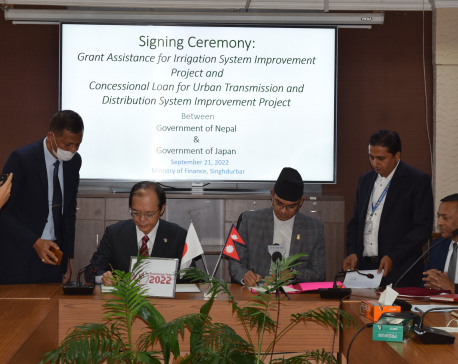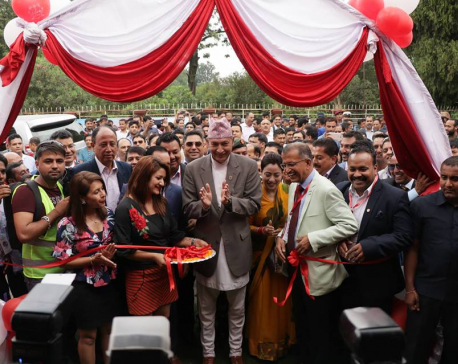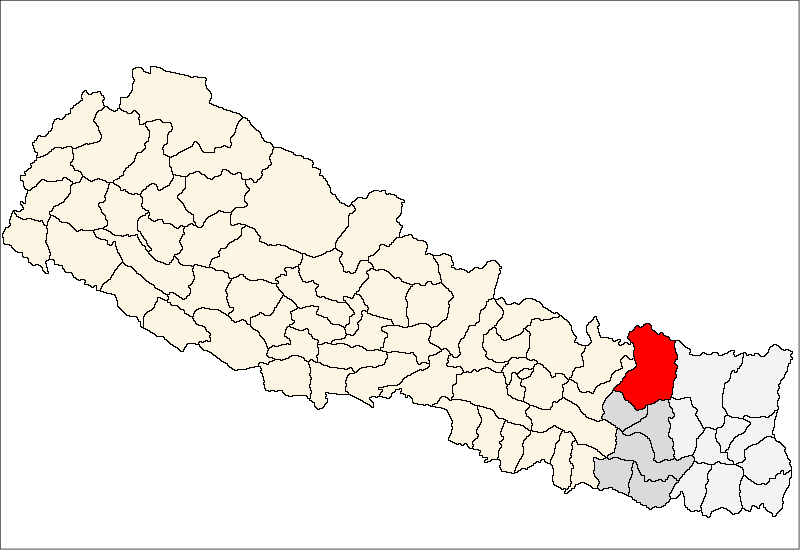
OR
Korean companies interested to import spring water from Nepal
Published On: July 22, 2019 11:47 AM NPT By: Nikeeta Gautam
KATHMANDU, July 22: South Korean companies have shown interest in importing glacial spring water from Nepal. However, due to lack of government policy, it may not happen immediately. The government has not set criteria for export of water, whether naturally occurring or processed, due to which exports may take some time.
Subash Bhandari, president of Nepal Bottled Water Industries Association, said that the association has been coordinating with Trade and Export Promotion Center (TEPC) to formulate proper policy for exporting spring and processed water from Nepal.
"Framing a policy for exporting spring and processed water is in the government's priority. The TEPC, Neeti Anusandhan Pratishthan (NeNAP), Ministry of Water Supply and Sanitation, and Ministry of Industry, Commerce and Supply have been working on framing a policy as soon as possible," said Sarad Bikram Rana, executive director of TEPC.
Rana said that the NeNAP as think tank and other concerned stakeholders have been holding discussions with bottled water entrepreneurs on the criteria needed for export.
"We have to especially focus on making the water bacteria-free and packaging it attractively," Rana said. Bhandari had verbally dealt with four beverage companies of South Korea during his visit to South Korea as a business delegate representing the Federation of Nepalese Chambers of Commerce and Industry (FNCCI) earlier this month.
"Though Korea also has hills, they are far less in altitude compared to Nepali mountains. Due to high mountains of Nepal, the Koreans are interested in importing glacial water from here which can be extracted 3,000 meters above sea level," he said.
Bhandari said that though Nepal has been informally sending mineral water abroad from time to time, due to lack of a proper policy, this is not regular.
"We need a quarantine lab to test the water. Only then Nepal can consistently export natural spring and processed water," he said.
Potential areas for collaboration explored
Seventeen members from the Federation of Nepalese Chambers of Commerce and Industry (FNCCI) visited South Korea this month to explore and interact with various business partners.
On the occasion, a memorandum of understanding (MoU) was signed between the Korean Women Entrepreneurs' Association and the Women Entrepreneurs' Committee of FNCCI about identifying areas for products that can be exported and imported between South Korea and Nepal.
Entrepreneurs from various sectors including beverages, agriculture, furniture, footwear, freight, and beauty products from both the countries participated in the conference.
Kamala Shrestha, president of Women Entrepreneurs' Committee, said that the committee will soon bring Korean mentors in areas including agriculture, garment, beverage, and beauty products.
"First, we need to build our own expertise so that we have knowledge about our products and a capacity to supply them," said Shrestha. “Entrepreneurs here have no idea even about products available in nearby areas. Connecting with all 77 districts to find internal markets may be the first step. Exports can then be gradually promoted."
Shrestha said that South Korean entrepreneurs have been talking about starting a joint-venture company on beauty products utilizing herbs from Nepal. "They have asked us for commercial production of medicinal herbs as well as herbs needed for cosmetics," she said.
Kiran Sakha, president of Nepal Korea Chamber of Commerce and Industry, said that the Korean consumers were very interested in using herbs, believing that it increased their immunity.
Both Shrestha and Sakha stated that the government needed to engage with the private sector to promote use of technology and support local products. "For example, to produce Allo, it is not difficult for the local community to invest and use machines to process it. However, difficulty comes when local community members cannot coordinate properly to use the technology. The role of government comes here," said Shrestha.
Likewise, Sakha said that the government had to actively promote products such as pashmina and carpet of Nepal. "There is also a high demand of these products in Korea," he added. "The private sector usually promotes these products for their individual companies. The government can promote for the whole country."
You May Like This

South Korea to provide Rs 2 billion to Nepal for two projects
KATHMANDU, Sept 23: South Korea is set to provide grants to establish a cyber bureau as well as reintegration of... Read More...
_20201014060614.jpg)
Nepal abstains from voting as UNHRC adopts resolution against Sri Lanka's human rights record
KATHMANDU, March 23: Nepal has chosen to abstain from voting in the United Nations Human Rights Council on a resolution... Read More...

Inaugurating auto show, FinMin stresses on lesser vehicle imports
KATHMANDU, Sept 11: The Minister of Finance, Dr. Yubraj Khatiwada's speech while inaugurating the 2018 NADA Auto Show caught everyone... Read More...





Just In
- Govt to provide up to Rs 500,000 for building houses affected by natural calamities
- China announces implementation of free visa for Nepali citizens
- NEPSE gains 14.33 points, while daily turnover inclines to Rs 2.68 billion
- Tourists suffer after flight disruption due to adverse weather in Solukhumbu district
- Vote count update: NC maintains lead in Ilam-2
- NAC's plane lands at TIA after its maintenance in Israel
- Indian Ambassador assures of promoting India's investment in Nepal
- Freak accident involving self-made pistol leaves young man injured in Banke














Leave A Comment